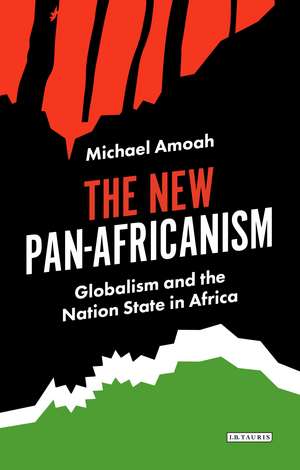The New Pan-Africanism: Globalism and the Nation State in Africa
Autor Michael Amoahen Limba Engleză Paperback – 30 ian 2019
| Toate formatele și edițiile | Preț | Express |
|---|---|---|
| Paperback (1) | 186.35 lei 3-5 săpt. | |
| Bloomsbury Publishing – 30 ian 2019 | 186.35 lei 3-5 săpt. | |
| Hardback (1) | 569.29 lei 6-8 săpt. | |
| Bloomsbury Publishing – 30 ian 2019 | 569.29 lei 6-8 săpt. |
Preț: 186.35 lei
Preț vechi: 241.63 lei
-23% Nou
Puncte Express: 280
Preț estimativ în valută:
35.67€ • 38.76$ • 29.98£
35.67€ • 38.76$ • 29.98£
Carte disponibilă
Livrare economică 31 martie-14 aprilie
Preluare comenzi: 021 569.72.76
Specificații
ISBN-13: 9781838600495
ISBN-10: 1838600493
Pagini: 328
Dimensiuni: 138 x 216 mm
Greutate: 0.41 kg
Editura: Bloomsbury Publishing
Colecția I.B.Tauris
Locul publicării:London, United Kingdom
ISBN-10: 1838600493
Pagini: 328
Dimensiuni: 138 x 216 mm
Greutate: 0.41 kg
Editura: Bloomsbury Publishing
Colecția I.B.Tauris
Locul publicării:London, United Kingdom
Notă biografică
Michael Amoah is a Visiting Fellow at the Firoz Lalji Centre for Africa, Institute of Global Affairs, The London School of Economics and Political Science. He is the author of Nationalism, Globalization and Africa; A Decadeof Ghana and Reconstructing the Nation in Africa (I.B.Tauris).
Cuprins
PrefaceIntroductionBurkina FasoBurundiThe Central African RepublicThe Democratic Republic of CongoLibyaMali RwandaSouth SudanConclusions
Recenzii
It should no longer be standard practice for sitting heads of government to extend their stay in power without the AU's intervention. How and when this governance problem can be resolved is perhaps the most pressing issue for the African continent. But the book demonstrates that an important start has been made. Amoah has written an important book pointing out that an ethical imperative is necessary in this context as well as practical ideas.
Michael Amoah takes a dispassionate look at approaches to political problems adopted by African states, under the auspices of the African Union. His discussion of what he calls 'the new pan-Africanism' emphasises its pragmatic qualities - romantic notions of the first generation of African leaders have been largely set aside. He is particularly interested on how notions of the nation state relate to institutions of global governance, and the ways which sitting heads of state manipulate constitutions to remain in power. Where international pressures are applied by other African states, they are limited in scope, and are likely to be compromised by the fact that the heads of state of the countries involved are also doing all they can not to be removed from office. Amoah's clearly written book is a good antidote for overblown claims about the emergence of African developmental states or a continent-wide 'renaissance'. It is a timely and sobering read.
The book sets a scene for an important discussion on a much needed alteration of political infrastructure of the African continent.
Michael Amoah takes a dispassionate look at approaches to political problems adopted by African states, under the auspices of the African Union. His discussion of what he calls 'the new pan-Africanism' emphasises its pragmatic qualities - romantic notions of the first generation of African leaders have been largely set aside. He is particularly interested on how notions of the nation state relate to institutions of global governance, and the ways which sitting heads of state manipulate constitutions to remain in power. Where international pressures are applied by other African states, they are limited in scope, and are likely to be compromised by the fact that the heads of state of the countries involved are also doing all they can not to be removed from office. Amoah's clearly written book is a good antidote for overblown claims about the emergence of African developmental states or a continent-wide 'renaissance'. It is a timely and sobering read.
The book sets a scene for an important discussion on a much needed alteration of political infrastructure of the African continent.
